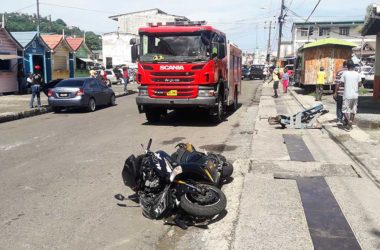THE 2.5 percent levy, which will be implemented on October 1, 2023, is a piece of legislation that drew the ire of many shortly after it was announced by Prime Minister Philip J Pierre in April of this year, during his 2023/2024 budgetary presentation in the Lower House of Assembly.
With stiff opposition to the levy coming from the main opposition, United Workers Party, whose leader Allen Chastanet wrote a letter to Pierre in which he called for the levy’s suspension on the grounds that it will cause an increase in the cost of living and the cost of doing business which will negatively impact household income in the country, Chastanet further stated that the levy is unconscionable.
Opposition to the levy came from other quarters as well which seemed to have forced the hand of government in delaying its implementation from July of this year to October. Government, since then, has taken time to explain the reasons for the levy, its objectives, and the benefits to be derived from its implementation.
Called a Health, Citizen and Security Levy, it is projected to raise $33 million dollars for the government and will not be imposed on food items but on selected goods. Exempt from the new levy are medicines, selected building materials, medical and security equipment.
The revenue to be collected from the new levy, according to the prime minister, will be used specifically to finance the health and security needs of Saint Lucia.
But selling the 2.5 percent levy to Saint Lucians appears to be a difficult task for the governing administration, hence its delay in implementation, we believe. Government, since then, has taken the time to hear the concerns of the people and has given several explanations as to why the levy will not negatively impact a certain class of Saint Lucians. But that is not necessarily the case.
Before we delve further we must remember that taxes are necessary fiscal measures used by every country in the world, irrespective of a country’s wealth to generate revenues for a country to finance its projects, investments, pay salaries, erect and maintain its infrastructure and to provide services for its citizens, etc., etc.
But taxes could be excessive, even one tax. This new levy is compulsory and will fall on everyone despite government’s assurance it will not be imposed on food items and other selected commodities; the intention drawn here is that the levy will not directly impact low income families.
The Health and Citizen Security tax is charged on importation of goods, provision of services by a VAT registered taxpayer in Saint Lucia and provision of services by a non-resident to a VAT registered taxpayer in Saint Lucia. This covers almost everyone in Saint Lucia.
A puzzling aspect of the 2.5 percent levy is that it is already being enacted despite its implementation date being Oct 1, 2023. How can that be? And will the government reimburse those persons who have already paid the levy before its implementation date?
While some VAT items will be zero rated for the next two years, commencement date being August 2, 2023, the new levy will only make life difficult for the very same people government is trying to protect, seeing that outside forces continue to raise prices of even the zero-rated VAT products outlined by government.
There is no escaping the fact that low income families and those on the poverty line are feeling the pinch with escalating prices in goods and services. Even they do not live on bread, sugar, and flour only. That 2.5 percent levy will somehow find its way to impact on them in one form or another.
One suggestion is that government, which we know needs cash, give the levy a trial run of six months and re-examine it again. Feel the pulse of the people as it relates to the levy then, and according to the feedback received, either suspend the levy or continue it.














Your idea of a dry run of the tax levy is sensible.
As it stands, the mandate presents as a shell game in which its contents are switched in whole upon all participants and commodities contained within the economic engines of the nation.
There, however, is apparently no malice in the administration’s tax venture (the country needs money).
Never-the-less, all caution must be taken to assure its feasibility in the balance between economic recovery and economic regression..
It is only in the experimental confines of a trial run that one can assess the pros and cons of the tax initiative, and thus procure a true forecast of its economic and societal value..
May GOD grant our leaders the foresight and humility necessary in this matter.